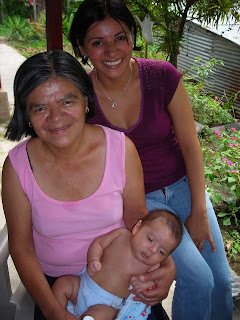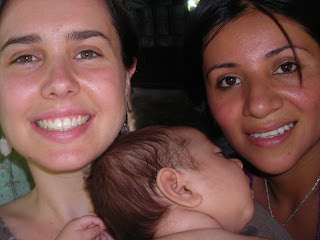Our group of 23 students arrived this past Tuesday. Thankfully, they were ready to hit the ground running on Wednesday morning. Champs. By Thursday afternoon, we had toured three hospitals and done a full day’s worth of orientation, and by Friday it hardly seemed they had arrived only three days ago. We toured our last hospital and clinic over the weekend, and on Friday were able to spend an amazing evening with a Salvadoran family who are friends of the Casa. The Quintanilla family (as any alum will vividly remember!) has thirteen children, and an incredible story. Their family fled from the countryside during the civil war here (1980-1992), spent time in a refugee camp and now lives in San Salvador. Their sons and daughters (aged 12-30ish) sang for us, played guitar, and generally shared a really great evening. I am always grateful for Salvadoran's endless well of hospitality. Why do we find it so hard to open our doors to strangers? (My camera is unfortunately out of batteries, so no pictures for now!)
On another note, I remembered how much I love accompanying students while they are here. On the whole, the group is bright, motivated and thoughtful about social justice issues. They have thought-provoking questions (such as: How does the machista culture of El Salvador affect funding for the women’s hospital?) and insights about the reality of El Salvador. I really appreciate the ways they challenge the status quo, and perhaps more importantly, the ways in which they are willing to challenge themselves. They are, in many ways, a community of accountability for me, seeing always with fresh, new eyes.
It’s just started to rain here, so I think I’ll write a little more. These past couple of days, I have been thinking about beliefs (now it’s really starting to come down) and how a belief finds its way into our heart and mind, and shapes how we think about the world. (Dina and Joanna...thank you for sharing this!) This has challenged me to think: What do I believe is important? What really matters? What can I neglect? Normally, I think, I am not as prone to change my beliefs so much as add new information into my current belief system in a way that builds on what is already there. How often, really, do we change what we believe in our heart of hearts, challenge that? My beliefs are so often taken for granted, yet they inform who I am, how I see of and make sense of the world, and what I believe to be possible. What do I really believe about who people are, and who I am in relation to them? Can I let people and the world change me, and teach me new, better truths? Not just in a way that adds on to what I already believe to be true, but in a deep-down way that pushes me to grow in new directions. I hope so. Maybe this is part of what it means to open up and let people in. Thankfully, I have a number of wonderful models, past and present, who have shown me how to do this… (whether or not they knew it ;)
Again changing gears... (This entry has been patched together over the past few days...) I realized the other day though that it is here: the desire to stay. Being here is in a way, a weight off my shoulders. I feel like what I am doing matters; that my gifts are being put to use. Not that I didn't find that fulfillment in bits and pieces before, but this is a more holistic sense of purpose. Part of that is sharing El Salvador with new people, walking with them through their struggles with language, culture and self that hopefully will turn their world upside down. I am a little farther along on that journey, and even though the beginning is rocky, I can say with confidence that it will be okay. As Annie and I decided tonight, if they've ade it this far, they will make it through to the end. With those initial challenges behind me, I am able to support our community in other ways like working on our home community and praxis sites and hopefully, being a friend and mentor to students who are immersed in El Salvador for the first time. In other words, I feel like the struggles I went through as a student are not put to waste here, but rather are part of an important foundation for who I am able to be here now. And also, hopefully, my work here is something that I am good at. Undoubtedly, it is something I find meaningful.
I am also freed by the knowledge that I am here with Salvadorans, learning more intimately about their reality, walking with people... whatever that means. I don't know how to describe that "work," if that's what it is, but I know that it is important. It is important to sit and listen, to ask questions, to learn from, to validate; to help people remember, help them bear, and carry with you a bit of whatever it was that they were carrying without you at first. To the best of my ability, I try not to be disillusioned with a "save the world" complex. On the contrary, I am quite aware of what we can each do as individuals. Knowing that I am doing that to the best of my abilities is freeing.
I find it freeing also to know that I am pushing myself to my limit, living comfortably with just enough discomfort. From a variety of different angles I am invited to be less afraid here, live with more integrity, more authenticity, more faith and fewer falsehoods. I am always walking a little bit in the dark, reaching for the light switch I believe to be just around the corner. The give and take of stress and growth is freeing.
Of course the exchange for freedom is the acquisition of new weights, but for some reason the weights of El Salvador are easier to bear (at the moment) than was life without their corresponding graces. I guess that is always the balancing act we pursue :)
At the moment, therefore, I want to imagine myself staying here beyond August, living in the newfound (or refound) freedoms of growth, security and purpose. (Allegra - this was yours!) For some reason, the three always seem to come together here for me. The question then is what about my environment here leads to that ... which is another blog entry all-together. When I let you know, I will figure it out. (<--- that was originally a typo, but I decided not an error.)
Hopefully next time I will have some photos to share... I know I've missed some great opportunities these past few days! Thanks for reading :)
With much love and gratitude to all of you; thank you for reading along, writing and sharing your thoughts! The are so very valued!
goodnight for now,
love,
elizabeth
P.S. Thank you to C.J. who taught me how to drive stick shift; and gave me a deeper appreciation for the metaphor of changing gears, if not the ability to drive from North Campus to South :)



